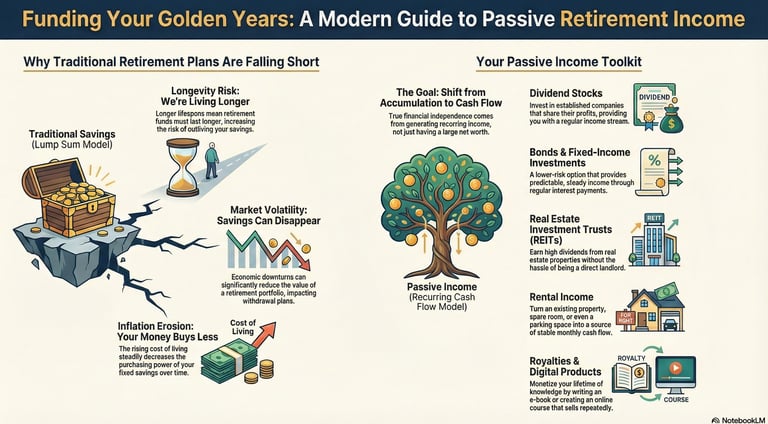Check requirements for Asia's Retirement Visas
Passive Income for Seniors: Funding Your Golden Years with Ease
Retirement often brings with it a shift in financial focus. While pensions, Social Security, and existing savings form the bedrock, many seniors seek ways to supplement their income without the demands of a traditional job. This is where passive income becomes a golden opportunity – earning money with minimal ongoing effort, allowing you to enjoy your well-deserved free time, pursue hobbies, and maintain a comfortable lifestyle.
The beauty of passive income for seniors lies in its flexibility and potential to provide a steady financial stream, offering peace of mind and greater financial security. It's about making your money (or assets) work for you, rather than the other way around.
Here are various modes of passive income available for seniors, designed to be less labor-intensive and more about smart financial strategies:




1. Annuities and Pension Payouts
These are often part of a formal retirement plan but serve as a crucial form of passive income.
Immediate Annuities: You pay a lump sum to an insurance company, and in return, they provide guaranteed regular payments for a set period or for life.
Pros: Predictable, guaranteed income stream, peace of mind.
Cons: Money is locked in, returns might be lower than other investments, inflation risk.
Defined Benefit Pensions: If you worked for an employer that offered a traditional pension plan, you receive regular payments after retirement.
Pros: Guaranteed income for life, often inflation-adjusted.
Cons: Less common now, tied to past employment.
2. Investment Income
This is perhaps the most traditional form of passive income and often the cornerstone of a retirement plan.
Dividends from Stocks: Invest in dividend-paying stocks, mutual funds, or Exchange Traded Funds (ETFs). Companies distribute a portion of their profits to shareholders as dividends, providing a regular income stream.
Pros: Can provide consistent income, potential for capital appreciation.
Cons: Market volatility can affect stock prices and dividend payouts (though many dividend companies aim for consistency).
Interest from Bonds/Fixed Deposits: Bonds (government or corporate) pay fixed interest rates over a set period. Fixed deposits (or Certificates of Deposit in some regions) in banks also offer guaranteed interest.
Pros: Generally lower risk than stocks, predictable income.
Cons: Lower returns compared to stocks, especially in low-interest-rate environments.
Real Estate Investment Trusts (REITs): These are companies that own, operate, or finance income-producing real estate across a range of property sectors. They trade on major stock exchanges like stocks and typically pay high dividends.
Pros: Diversification into real estate without direct property ownership, high dividend yields.
Cons: Subject to real estate market fluctuations and interest rate changes.
3. Rental Income from Real Estate (Do not suggest acquiring new properties)
If you own property, turning it into a rental can be a significant source of passive income.
Long-Term Rentals: Rent out a spare room, a basement apartment, or an entire property you own.
Pros: Stable monthly income, potential for property value appreciation.
Cons: Requires initial setup (finding tenants, legal agreements), ongoing maintenance, and potential tenant issues (though property managers can handle this for a fee).
Short-Term Rentals (e.g., Airbnb): Rent out a property or a room for short durations to tourists.
Pros: Potentially higher income than long-term rentals, flexibility to use the property yourself.
Cons: More active management (cleaning, guest communication, bookings), subject to local regulations and seasonality.
Parking Space Rental: If you have an extra parking spot in a desirable location, renting it out can be surprisingly lucrative.
Pros: Very low effort, consistent income.
Cons: Limited to specific locations.
4. Royalties and Licensing
If you have a creative background or specialized knowledge, this can be a rewarding avenue.
Book Royalties: If you've written a book (fiction, non-fiction, or even a specialized guide), you can earn royalties each time it sells. This includes e-books and audiobooks.
Pros: Long-term income from a one-time effort.
Cons: Requires significant upfront effort to write and publish, sales are not guaranteed.
Music/Art Licensing: If you create music, photography, or other forms of art, you can license your work for use in commercials, films, websites, or other media.
Pros: Income from creative work, can reach a wide audience.
Cons: Requires talent and marketing, income can be unpredictable.
Patent Licensing: For those with inventions, licensing a patent can provide a steady stream of income from companies that use your patented technology.
Pros: High potential income.
Cons: High upfront cost and complexity of obtaining a patent.
5. Digital Products and Online Assets
Leverage your knowledge and skills to create digital products that sell repeatedly.
Online Courses/E-books: Create a course or e-book on a topic you're knowledgeable about (e.g., a hobby, a skill, a life experience). Once created, it can sell repeatedly.
Pros: Scalable, can reach a global audience, leverages existing knowledge.
Cons: Requires upfront effort in creation and marketing.
Stock Photos/Videos: If you enjoy photography or videography, you can upload your work to stock media sites (e.g., Shutterstock, Adobe Stock) and earn royalties each time someone licenses your content.
Pros: Income from a passion, minimal ongoing effort once uploaded.
Cons: Requires quality work, competitive market.
Affiliate Marketing: Promote products or services you believe in through a blog, website, or social media. You earn a commission for every sale made through your unique affiliate link.
Pros: No need to create your own product, flexible.
Cons: Requires building an audience, income depends on conversions.
Important Considerations for Seniors:
Risk Tolerance: Assess your comfort level with risk. Investment income carries market risk, while rental income has property-related risks.
Tax Implications: Understand the tax implications of different passive income streams in your country of residence and any foreign countries involved. Consult a tax advisor.
Upfront Effort vs. Ongoing Maintenance: While "passive" implies minimal effort, most streams require significant upfront work or occasional maintenance. Choose something that aligns with your energy levels.
Scam Awareness: Be highly skeptical of "get rich quick" schemes or anything promising unrealistic returns with no effort. If it sounds too good to be true, it probably is.
Consult Professionals: Before making significant financial decisions, especially regarding investments or real estate, consult with a qualified financial advisor, tax professional, or legal expert.
This article is for informational purposes only and does not constitute financial advice. Consult a qualified financial professional before making any financial decisions, as investments and strategies involve risk.


Address
Blk 8 Cantonment Close
SIngapore